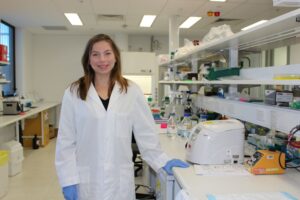In a world first, researchers from Flinders University have applied advanced gene editing to explore how an enzyme, made famous in the COVID-19 pandemic, plays a pivotal role in the healthy development of the placenta during pregnancy.
Connected to the developing baby by the umbilical cord, the placenta provides essential oxygen and nutrients until the baby is born. Complications with the placenta can happen during pregnancy, birth and after birth and are potentially dangerous to mother and baby.
The study, published in the journal, Cell Death & Disease, reveals important progress in unravelling how the enzyme, 'angiotensin-converting enzyme 2' (ACE2), contributes to healthy placental and fetal development.

The research was led by Dr Anya Arthurs and Professor Claire Roberts from the Pregnancy Health and Beyond (PHaB) Laboratory in the Flinders Health and Medical Research Institute (FHMRI).
"Despite significant advances in obstetric care, complications such as small for gestational age births, fetal growth restriction and preeclampsia continue to pose substantial risks to mother and baby," says molecular biologist Dr Anya Arthurs.
"Our findings not only improve our understanding of vital functions in placental health but also provides new insights into the genetic underpinnings of placental development and its impact on pregnancy outcomes."
The research was done with models of human placenta called organoids; grown from donated placental tissue, they mimic the functionality and architecture of early gestation placentas.
The team then tested how the enzyme ACE2 affects the development of the placenta, using gene-editing to create placental organoids with different versions of the ACE2 gene.
"We wanted to specifically look at two scenarios, one without the ACE2 gene (called knockout) and one that included a genetic variation known as rs2074192, which has been associated with various health complications, including those related to pregnancy and diseases like high blood pressure and COVID-19.
"By creating these different mini placentas, we could examine how ACE2 normally works, and how various versions of this gene (there are three variations: CC, CT, and TT) can influence the development or failure of the placenta.
"We found that ACE2 plays a key role in helping the cells in the placenta grow properly and when it is 'knocked out' the cells struggled to grow, and more cell death was observed.
"We also confirmed that the genetic variation, rs2074192, alters the dynamics of placental development, linking it to major pregnancy complications such as preeclampsia and small for gestational age births."
The study indicates that while ACE2 expression is essential, the activity and balance of the enzyme may be even more crucial for healthy development of the baby.

Senior author Professor Claire Roberts






